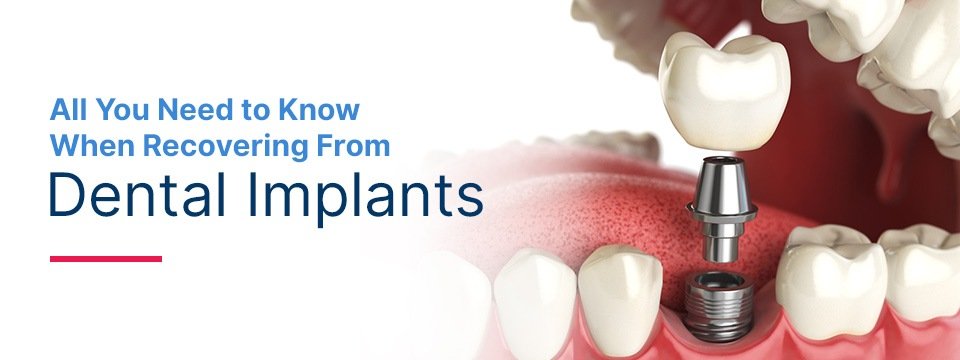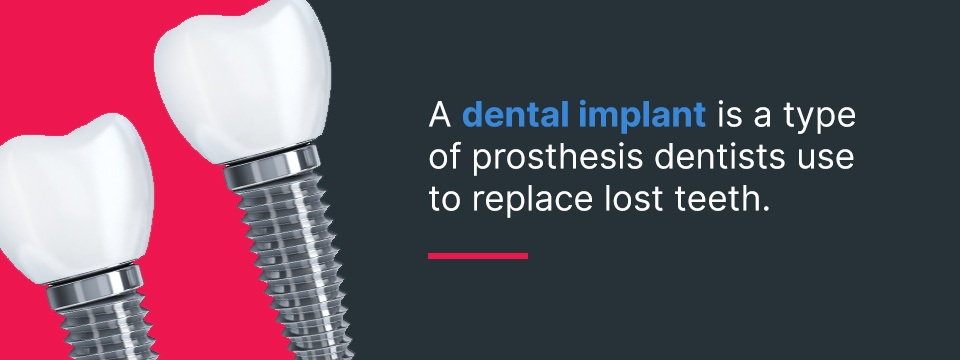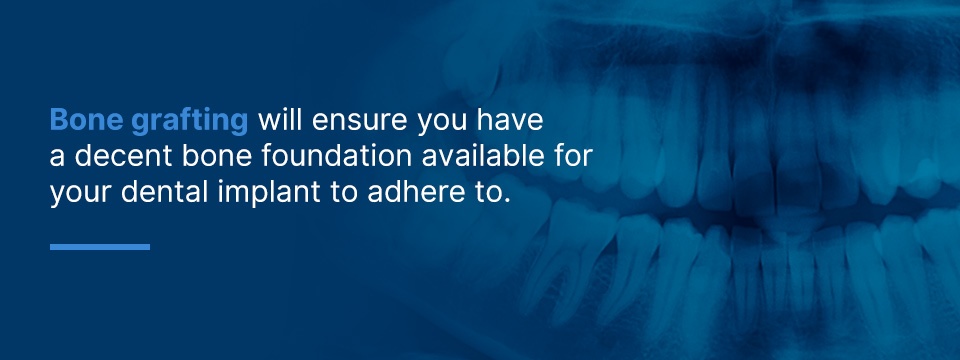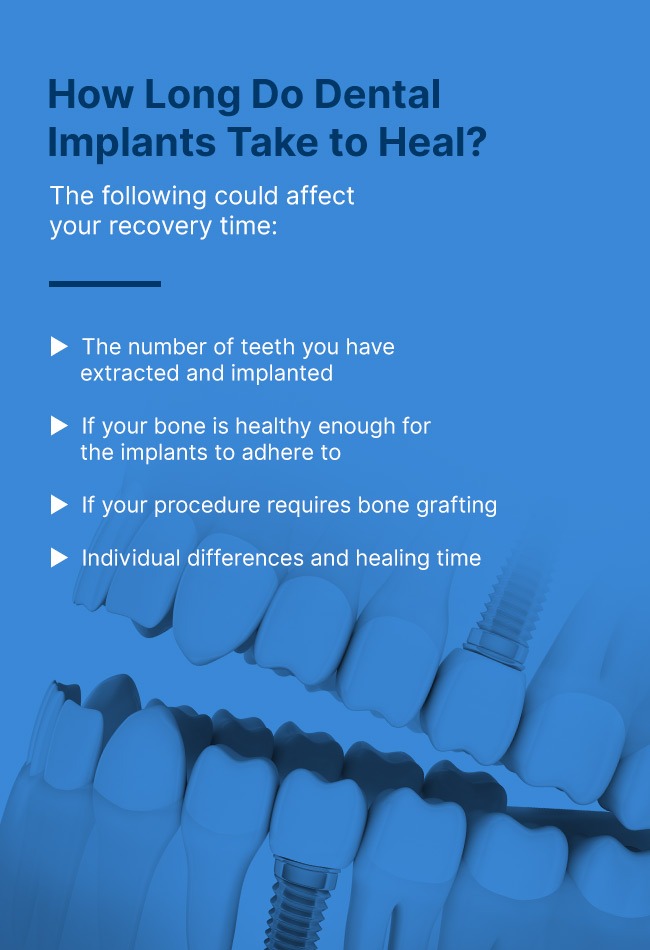July 24, 2019

Tooth loss is common and can occur due to trauma or disease. Dental implants can help replace missing teeth.
American Association of Oral and Maxillofacial Surgeons statistics show 69 percent of adults between 35 years old and 44 have at least one permanent tooth missing because of gum disease, an accident, tooth decay or a failed root canal. Additionally, 26 percent of adults will have lost all their teeth by the age of 74. Dentists place around 100,000 to 300,000 implants each year.

A dental implant is a type of prosthesis dentists use to replace lost teeth. Implants are a small titanium post dentists insert into your jawbone, on top of which the dentist attaches:
Once the dental implant integrates into your bone, the dentist connects a structure called an abutment to the implant used to attach the artificial tooth or teeth.
You can use dental implant surgery as an alternative to bridgework if your natural teeth roots won’t allow it or if dentures don’t fit well.
How your dentist performs dental implant surgery depends on the condition of your jawbone and the type of implant. The dental implant surgery could involve a few procedures. The big advantage of implants is they provide a solid support for the new teeth you’re going to get. This requires your bone to heal around your implant tightly. Since it takes time for your bones to heal, the entire process can take several months.
Here is some necessary information on dental implant recovery time.
If you’re thinking about having dental implant surgery, you should know approximately how long the process could take before you even schedule your surgery. Like with most operations, the time it takes for the entire dental implant procedure to progress from your initial consultation to your procedure to your healing and recovery is variable. It depends on the type of surgery you require, your overall oral health, and whether or not you will need grafting or tooth extractions.
A general dental implant procedure timeline is as follows:
Your consultation could take anywhere from 45 minutes to an hour. It gives you a chance to talk with your dentist about your options, ask your questions about the upcoming procedure, and see if implants are a good option for you. The dentist will ask about your overall health and talk with you about your specific dental needs. They may give you a 3D CT scan to decide if you’re a good candidate for the procedure and to tailor a treatment plan.
After your initial consultation, if both you and your dentist decide you should go ahead with the treatment plan, they’ll next take some impressions of your jaw and teeth. Usually, this is around a week or two after your consultation. At this time, you may also talk about what to expect after dental implant surgery.
While not all cases require tooth extraction, you could need one or several. The dentist will let you know if they need to extract any teeth. This part of the procedure can vary in its own. If you have healthy bone, you might be able to have your implant procedure done the same day the dentist removes your natural tooth. But, this isn’t always the case for individuals suffering from infection or bone loss. If this is the case with you, you may require bone grafting.

You may require bone grafting not only if you had a tooth extracted, but also if you’ve been missing a tooth or teeth for a while. Bone grafting will ensure you have a decent bone foundation available for your dental implant to adhere to. So, if you’re missing teeth, this stage is important. Usually, there are several months of healing time between a bone graft and dental implant surgery.
Once the dentist completes the preparations above, they’ll schedule your dental implant procedure. During the operation, the dentist inserts your implants into your bone. Depending on what’s ideal for you, they’ll either submerge the implant in your gum or not submerge it.
Chances are, you have questions like how long does it take for gums to heal after dental implants? Is there throbbing pain after dental implant, or how long do dental implants hurt?

Whether your dentist performs your procedure in one stage or several, you could experience discomfort — like you would with many other dental surgeries. This discomfort could be:
You might require pain medicines or antibiotics following your implant procedure. If discomfort, swelling or any other issue becomes worse in the days following your procedure, contact your dentist.
After every surgery stage, you might need to consume softer foods until your surgical area heals. Generally, your dentist will use self-dissolving stitches. If not, they’ll need to remove them.

There’s no set recovery time for all implant patients since each patient’s unique oral condition will affect the surgery. The following could affect your recovery time:
Your tolerances and lifestyle choices may greatly impact your dental implant healing time. For instance, if you smoke, you should avoid smoking or at least minimize it for a week or two after your procedure. If you smoke after surgery, you could increase the amount of time it takes to recover or cause possible harm to your healing process, especially if you had grafting done.
If you had a simple implant placement procedure with no grafting, you would likely experience very little to no swelling or discomfort after your operation. If you do, it will likely only last for a few days. The dentist may prescribe you medication to help with any pain. After around seven to 10 days, you should be able to get back to your regular diet routine. However, sometimes patients may have to stick with a soft diet after their surgery for up to six weeks. The dentist will let you know.
They type of implant surgery you have will determine how much dental implant procedure pain you experience:
Here you’ll find a general pain timeline for your recovery time:
At this point, it’s normal for you to experience some pain.
Your pain should have gone away at this point. If not, call your dentist immediately as it could indicate an infection.
If you’re experiencing pain at this point, it could be due to one of these reasons:
In any of these cases, call your dentist right away.
Once you’ve gotten through your dental implant surgery, you’ll have to take care of your mouth, so your recovery is easy and quick.
Here are some post-dental implant tips:
After your dental surgery appointment, take the rest of the day off to get some rest. If the dentist gave you a sedative, you’ll likely still feel drowsy. Therefore, you shouldn’t do anything where you’ll have to concentrate, such as driving. You should also avoid strenuous activities. Don’t lift or bend anything that could dislodge the blood clots and lead to bleeding. When it’s time for you to go to bed, elevate your head using extra pillows.
Your dentist may tell you to avoid brushing and mouthwash at first since your mouth might be too sensitive for standard oral hygiene at this point. They may tell you to avoid brushing the tender area, but to clean your other teeth as you usually would. They may have you rinse with salt water using eight ounces of warm water mixed with a 1/2 teaspoon of salt.

You may have bruises or swelling of your face, which is normal. Apply ice to your jaw for 30 minutes, remove for 20 minutes, and repeat for the first 24 hours. If both sides of your mouth had surgery, apply the ice to each side of your mouth, switching from side to side. Your swelling should lessen after a few days. If it becomes worse, you notice pus, or you have a fever, it could be an infection. Let your dentist know immediately.
Do your best not to disturb the clot as it’s healing the wounds in your mouth. Therefore, don’t drink carbonated beverages, alcohol or drink from a straw. Also, don’t smoke for a few days after your operation and try to avoid spitting.
Soft, cool foods after your procedure are good. Some solid options are:
Avoid foods too cold, hot, chewy, tough or spicy.
You will probably need pain medicine at first to manage your pain. In some cases, over-the-counter pain relievers like NSAIDs and acetaminophen are fine, but in other cases, your dentist might need to prescribe you something stronger.
Keep a lookout for fever, infection or swelling that lasts more than a couple days. Also, pay attention to your breathing or swallowing for any troubles. You could also suffer an allergic reaction to the anesthetic the dentist gave you. If so, contact your dentist immediately, and go to the ER.
Be sure you show up to all your post-surgery follow-up scheduled appointments so the dentist can make sure you’re properly healing.
Can dental implants last forever? In other words, how long do dental implants last? Unlike your natural teeth, implants aren’t vulnerable to dental disease like decay, but your gum health is essential for maintaining lasting dental implant success. Caring for dental implants through routine professional cleanings, dental check-ups and conscientious home care are key to dental implant sustainability. Every individual is different, however. The success of your dental implants will rely on planning and diagnosis, your medical history and lifestyle choices during your healing.
Some things you can do to protect your remaining natural teeth and help your dental work are:

Dental implants have a 95 percent overall success rate, so you’re looking at only around a 5 percent failure rate.
Most implants are successful. However, sometimes the bone can fail to fuse to the metal implant sufficiently. Also, things like smoking can contribute to implant complications and failure. If your bone doesn’t fuse correctly, the dentist will remove the implant, clean the bone up and try the operation again in a few months.
While research on implant materials, designs and techniques has increased over the past several years, and professionals expect it to expand in the future, there’s still much work needed in the use of better implant design, biomaterials, functionalization of surfaces and surface modification to improve the treatment’s long-term outcomes.
Of course, dental implant surgery is best performed by a skilled and trained surgeon. An oral and maxillofacial surgeon (OMS) carries the specialized training and education in the complexities of the skin, muscles, bone and nerves involved, so you’ll get the best results possible.
A study in 2014 suggests increased dental implant success rates when a dental specialist performs the procedures. The study’s researchers enrolled 922 implant patients from 87 different practices, with an average follow-up of 4.2 years follow-up. Of these 922 implants that had thorough available data records, 64 (7.0 percent) received a “failure” classification when there was an exclusion of excessive bone loss from the analysis.
When they included excessive bone loss in the analysis, 172 implants (18.7 percent) received a “failure” classification. The univariate analysis results showed a history of severe periodontitis, areas with type IV bone or pre-existing inflammation, cases of immediate placement of dental implants and canine or incisor region placement linked with implant failure.
These results of the study suggest implant success rates and survival rates in general dental clinics might be lower than those in specialty or academic settings.
Hiossen Implant is considered one of the leading five dental implant companies worldwide due to our dedication and commitment to developing safe, effective, innovative and high-quality dental implants. We’re on track to achieve our mission by conducting exhaustive research, testing and clinical studies. We also make it a high priority point to listen to clinician input and use our five-step quality control process. Contact us today to find out more about our dental implants.